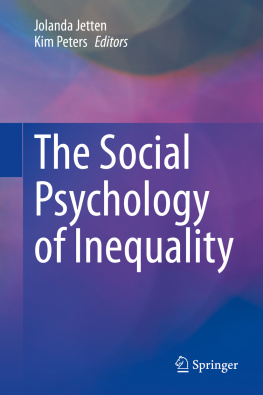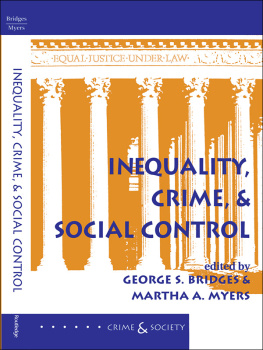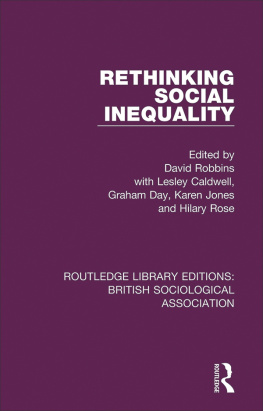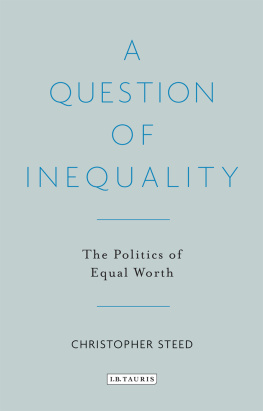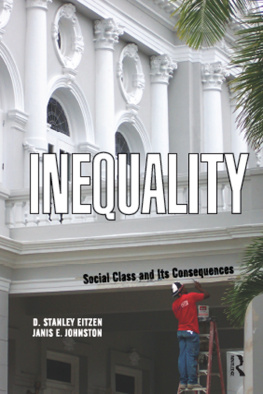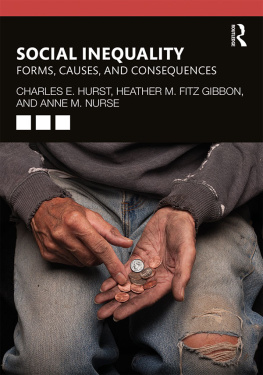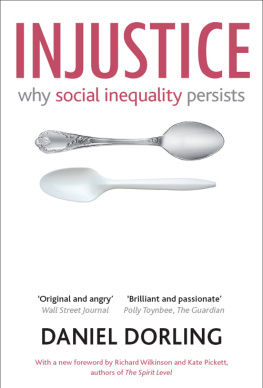Jolanda Jetten - The Social Psychology of Inequality
Here you can read online Jolanda Jetten - The Social Psychology of Inequality full text of the book (entire story) in english for free. Download pdf and epub, get meaning, cover and reviews about this ebook. year: 2019, publisher: Springer International Publishing, genre: Politics. Description of the work, (preface) as well as reviews are available. Best literature library LitArk.com created for fans of good reading and offers a wide selection of genres:
Romance novel
Science fiction
Adventure
Detective
Science
History
Home and family
Prose
Art
Politics
Computer
Non-fiction
Religion
Business
Children
Humor
Choose a favorite category and find really read worthwhile books. Enjoy immersion in the world of imagination, feel the emotions of the characters or learn something new for yourself, make an fascinating discovery.
- Book:The Social Psychology of Inequality
- Author:
- Publisher:Springer International Publishing
- Genre:
- Year:2019
- Rating:4 / 5
- Favourites:Add to favourites
- Your mark:
- 80
- 1
- 2
- 3
- 4
- 5
The Social Psychology of Inequality: summary, description and annotation
We offer to read an annotation, description, summary or preface (depends on what the author of the book "The Social Psychology of Inequality" wrote himself). If you haven't found the necessary information about the book — write in the comments, we will try to find it.
The Social Psychology of Inequality — read online for free the complete book (whole text) full work
Below is the text of the book, divided by pages. System saving the place of the last page read, allows you to conveniently read the book "The Social Psychology of Inequality" online for free, without having to search again every time where you left off. Put a bookmark, and you can go to the page where you finished reading at any time.
Font size:
Interval:
Bookmark:
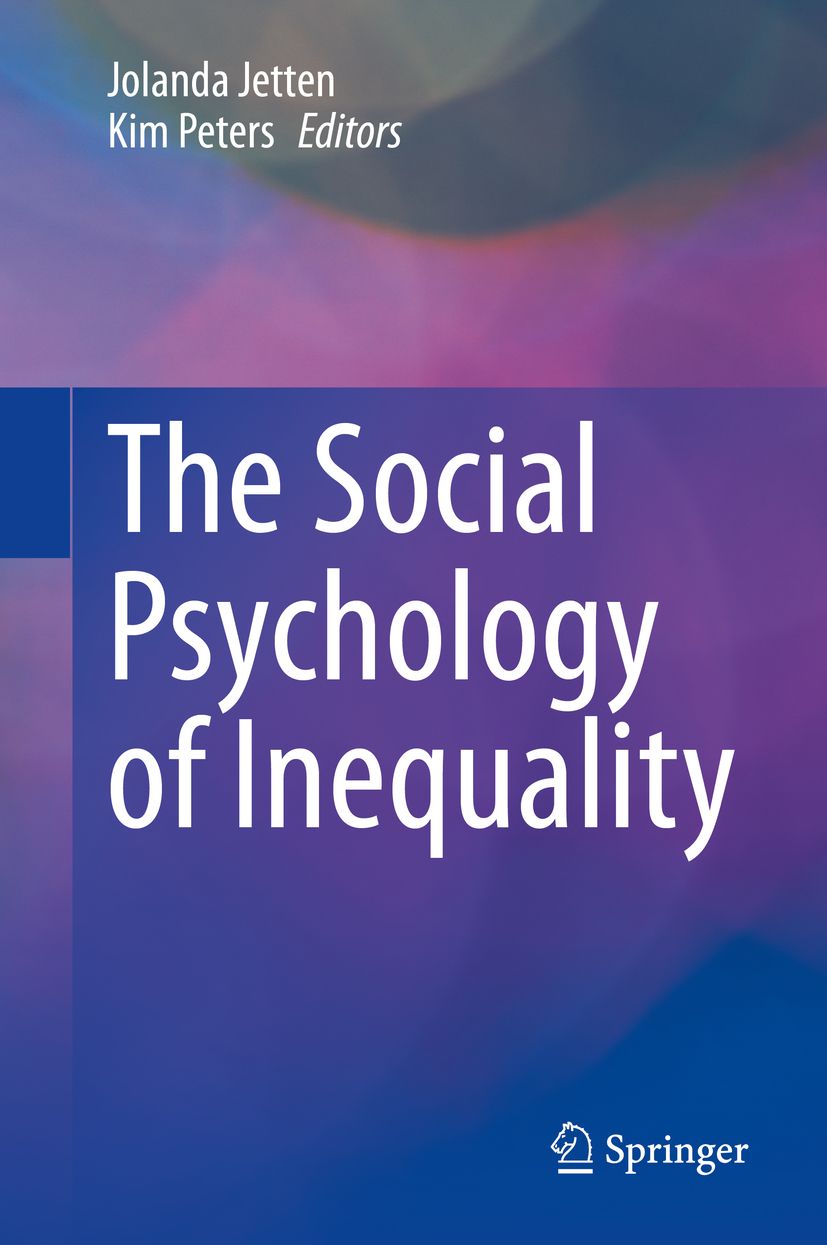

This Springer imprint is published by the registered company Springer Nature Switzerland AG
The registered company address is: Gewerbestrasse 11, 6330 Cham, Switzerland
There can be little doubt that economic inequality is a major societal issue, one that has started to attract the attention of the general public, as well as economists, politicians and social commentators. A key reason for the increased attention to economic inequality is that there is evidence that it is growing, rather than shrinking or remaining stable. In the UK, for example, figures from the Equality Trust (2019) show that the top one-fifth of households receive 40% of national income, whereas the bottom one-fifth receive just 8%. These figures are based on the 2016 data. In the 40 years between 1938 and 1979, income inequality in the UK did reduce, with the share of income going to the top 10% of the population falling from around 3521%. However, this trend reversed quite markedly in subsequent decades. Between 1979 and 2009/2010, the top 10% of the population increased its share of national income from 21% to 31%, whereas the share received by the bottom 10% fell from 4% to 1%.
The UK is not exceptional in this respect. In the USA, the top 1% of incomes grew five times as quickly between 1979 and 2015 as the bottom 90% (Sommeiller & Peters, 2018). Admittedly, the UK and the USA are two of the most unequal societies in the world, as far as income inequality is concerned; however, the same trends are evident in many other countries. In OECD countries, income inequality is now at its highest level in 50 years: the average income of the top 10% of the population is roughly nine times that of the bottom 10%, an increase from seven times as great just 15 years ago (OECD, 2019).
The data for wealth inequality are even starker. In Great Britain, the top 10% of households have 44% of total wealth. The poorest 50%, by contrast, have just 9% of total wealth, and there is evidence that this inequality has increased in recent years (Office for National Statistics, 2019). In the USA, data show that wealth inequality has increased markedly since the 1980s, with the top 1% holding 40% of the wealth in 2016, compared with 2530% in the 1980s (Zucman, 2019). There is also evidence that the wealth inequalities between counties are growing. According to an analysis prepared by the UK House of Commons Library, the richest 1% of the worlds population is currently on course to own just under two-thirds of the global wealth by 2030 (All-Party Parliamentary Group on Inclusive Growth, 2018); unsurprisingly, the vast majority of these so-called ultrahigh net worth individuals live in the global north (Credit Suisse Global Wealth Databook, 2018).
Economic inequality clearly has a moral dimension: What can possibly justify these huge discrepancies in income and wealth, both within and between countries? It also has a clear social and political dimension: as history has shown us, glaring inequalities in income and wealth threaten social cohesion. Less obvious to some, perhaps, is that economic inequality has an important psychological dimension: How and why does such inequality affect the ways in which people think and feel and act? And what can theory and research tell us about the psychological factors and processes that help to maintain and justify economic inequality? It is these questions that are addressed in the present volume.
The editors of this timely volume have assembled a set of very impressive contributions from the worlds leading researchers on this topic. Between them, they examine how economic inequality shapes and is shaped by institutions such as the workplace, schools and universities; how and why economic inequality influences our individual and social behaviours, ranging from the kind of food we eat to our readiness to help others in need; and what helps to account for the sheer stubbornness of economic inequality, ranging from the language we use to describe inequality to the ironical effects of social mobility beliefs.
The net result is a volume that is informative, thought-provoking and ultimately despite the despair that can be experienced when analysing a phenomenon with such corrosive effects inspirational. This focus on the social psychology of economic inequality can only serve to raise general awareness and understanding of its pernicious effects and thereby enhance our motivation to rein it in.
All-Party Parliamentary Group on Inclusive Growth. (2018). House of Commons Library Research . Retrieved from https://www.inclusivegrowth.co.uk/house-commons-library-research/
Credit Suisse Global Wealth Databook. (2018). Retrieved from https://www.credit-suisse.com/corporate/en/research/research-institute/global-wealth-report.html
Equality Trust. (2019). How has inequality changed? Retrieved from https://www.equalitytrust.org.uk/how-has-inequality-changed
OECD. (2019). Inequality and income . Retrieved from http://www.oecd.org/social/inequality.htm#income
Office for National Statistics. (2018). Wealth in Great Britain Wave 5: 2014 to 2016 . Retrieved from https://www.ons.gov.uk/peoplepopulationandcommunity/personalandhouseholdfinances/incomeandwealth/bulletins/wealthingreatbritainwave5/2014to2016
Sommeiller, E., & Price, M. (2018). The new gilded age: Income inequality in the US by state, metropolitan area, and county . Washington, D.C.: Economic Policy Institute. Retrieved from http://www.epi.org/147963
Zucman, G. (2019). Global wealth inequality (Working Paper No. 25462). Cambridge, MA: National Bureau of Economic Research. https://www.nber.org/papers/w25462
Font size:
Interval:
Bookmark:
Similar books «The Social Psychology of Inequality»
Look at similar books to The Social Psychology of Inequality. We have selected literature similar in name and meaning in the hope of providing readers with more options to find new, interesting, not yet read works.
Discussion, reviews of the book The Social Psychology of Inequality and just readers' own opinions. Leave your comments, write what you think about the work, its meaning or the main characters. Specify what exactly you liked and what you didn't like, and why you think so.

